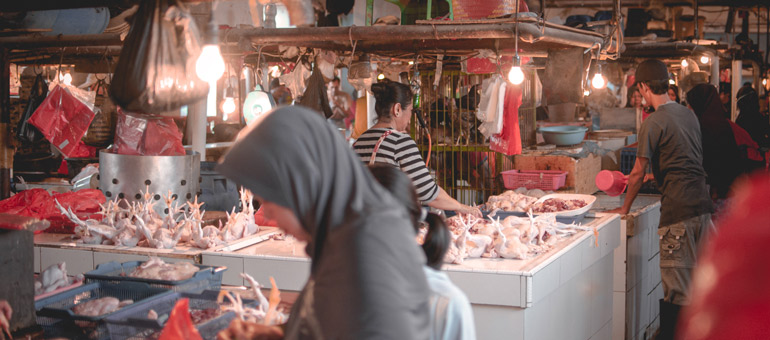For the first time in the world, there are more people now living in cities than there are in rural areas. More than half the world’s population currently lives in urban areas, and this is expected to increase to 70% by 2050. Growing urban populations demand more from our planet in terms of natural resources and the need for greater innovation in health, nutrition, quality and energy has become a priority.
Our current food system is failing to deliver sufficiently healthy and nutritious products to people, in particular to the most vulnerable populations. And this same food system is damaging the world’s biodiversity and natural resources. Urban nutrition has been underestimated for far too long and we now realize that the world cannot longer ignore this problem. The good news is that we have the power, the know-how and the means to change this and fix the global food system.
It is to discuss possible #UrbanNutrition solutions that GAIN, in partnership with the Global Health Centre of the Graduate Institute of International and Development Studies, hosted an event titled "Protecting our Planet’s Health: Growing cities, Poor nutrition, What can be done?" on Thursday, 10 November in Geneva. The purpose of this event was to discuss how we can improve the nutrition of vulnerable urban populations and to build upon the discussions from a recent Habitat III side event on Good Governance for Healthy and Sustainable Urban Food Systems this month, which GAIN hosted jointly with Food Smart Cities for Development – an EU project coordinated by the City of Milan – and the Ministry of Foreign Affairs of The Netherlands.

Our current food system is failing to deliver sufficiently healthy and nutritious products to people, in particular to the most vulnerable populations. © Unsplash
In her keynote speech, Gerda Verburg, Coordinator of the Scaling Up Nutrition (SUN) Movement, highlighted: "One of the main challenges we face is to harness the urban power; to better connect urban and rural spaces; to include the farmers who are looking for better connections to markets, support to build storages in order to avoid a lot of food losses, to have the infrastructure they need to create a sustainable and effective food value chain so that they can get to markets." She raised the importance of creating win-win solutions for both urban and rural areas: "Let’s not start by reinventing the wheel. Let’s try to bring the different players together and make them work together for concrete scalable results that can have a positive impact on the lives of the most vulnerable."
"A quarter of all urban populations – children under 5 – are stunted and two thirds of people who suffer from Type 2 diabetes, which is largely associated with obesity, live in cities," said Lawrence Haddad, GAIN’s Executive Director in his presentation. "Cities are suffering from a growing double burden, or even triple burden of malnutrition problem. GAIN is going to be moving more and more towards a food system approach and we will be working with all sector of society, particularly with businesses because they are highly involved in food systems. Only fixing food systems will help us tackle malnutrition in all its forms."
"As urbanisation continues to expand in most countries around the world, we have no choice but to effectively link together SDG2 (end malnutrition) and SDG11 (make cities inclusive and sustainable)," said Ambassador Dr Reinout Vos, Deputy Head of Mission, Permanent Representation of the Kingdom of the Netherlands in Geneva. "It is crucial that children are re-connected to nutritious food and to food production. In light of urbanisation, there is a strong shift from quantity to quality and it is obvious that the ensuring quality food for all is now one of the greatest challenges of our time."
According to Katia Santos Dias, GAIN Mozambique Country Director: "In Mozambique, about 32% of the total population lives in urban areas and it is growing at almost a 4% annual rate. Despite Mozambique’s impressive growth and potential, 55% of the population lives below the poverty line, many of them live in urban and peri-urban areas." She added: "We need to rethink the definition of vulnerability. Poor people in urban areas rely mostly on the market to get their foods, are dependent on their wages and do not have the means to produce their own foods. GAIN, with support from USAID and the Feed the Future Initiative, created the Marketplace for Nutritious Foods, a programme designed to foster innovation and support promising small and middle income businesses that produce healthy, safe and affordable for low income consumers."
In his closing remarks, Guillaume Taylor, Co-founder and Managing Partner of Quadia and member of the GAIN Board of Directors, pointed out: "All stakeholders, from industry to the public sector, from financial players to NGOs, from academics to consumers, share the same chain of responsibilities and thus collectively need to be part of the solution if we are to make nutritious foods cheaper and easier to access, particularly to vulnerable urban populations. It is in this spirit that we invite everyone to join us in making sustainable, healthy and nutritious food systems possible."